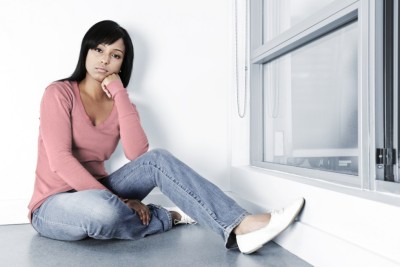
Those who know me well know that I have been living with depression and anxiety for a while. I, like so many women, have delayed seeking help and suffered silently. Why? Well, the reason I did not seek help for my problem for as long as I did is not just because I’m a chronic procrastinator even though I’m sure that played a major part. The main reason, I think, is because mental illness is treated as somewhat of a taboo in our culture, and I was afraid of being labeled and attached to negative stigma.
 According to the World Health Organization’s website only 2 out of 5 people experiencing a mood, substance or anxiety disorder seek help in the initial onset of the disorder. That could be because they do not know exactly what they’re experiencing. However, a more likely scenario is perhaps shame or fear that those around them will deny the existence of their very real and debilitating illness. How many times have I confided in someone only to have them say, just think positively, work out or do the things that you love and you’ll be happy. I know they mean well, but the problem with that logic is that it views my mental illness as this emotion I can just turn on and off if I just put the effort in. Plus, I have already done those things. Yeah, there are days when I crawl into my room and cannot muster the energy to move. But way more often than that, I am out doing things I love, spending time with my favorite people, doing yoga or going for a run. All of those things absolutely make me feel better, but they are not a cure for my depression. It is always there as this ever-lurking darkness that I cannot seem to shake no matter how much I try.
According to the World Health Organization’s website only 2 out of 5 people experiencing a mood, substance or anxiety disorder seek help in the initial onset of the disorder. That could be because they do not know exactly what they’re experiencing. However, a more likely scenario is perhaps shame or fear that those around them will deny the existence of their very real and debilitating illness. How many times have I confided in someone only to have them say, just think positively, work out or do the things that you love and you’ll be happy. I know they mean well, but the problem with that logic is that it views my mental illness as this emotion I can just turn on and off if I just put the effort in. Plus, I have already done those things. Yeah, there are days when I crawl into my room and cannot muster the energy to move. But way more often than that, I am out doing things I love, spending time with my favorite people, doing yoga or going for a run. All of those things absolutely make me feel better, but they are not a cure for my depression. It is always there as this ever-lurking darkness that I cannot seem to shake no matter how much I try.
Depression is the most common women’s mental health issue. Research shows that women are almost 40% more likely to develop major depressive disorder than men. This is due to factors such as our socioeconomic standing and our less than stellar treatment in societies when compared to their male counterparts. Also, women are more likely to experience traumatic events in their lives (1 in 4 women have been victims of attempted or completed sexual assaults). Trauma can lead to a bunch of mental disorders such as post-traumatic stress disorder, depression and anxiety.
The black struggle when it comes to mental illness is a bit more pronounced. Even though African-Americans are 20% more likely to experience serious mental health problems than the general population according to the Health and Human Services Office of Minority Health, culturally and historically, we’ve tended to ignore or diminish the existence of mental illness amongst our community. Black people are more likely to experience circumstances that lead to decreased mental health such as poverty and violence, especially our brothers and sisters who live in inner city and impoverished areas. However, they face the most hurdles in getting treatment. Lack of access to proper education and affordable health care paired with economic and sociopolitical obstacles make it extremely difficult for a vast majority of black people, especially black women, to get treatment for mental illness.
My point is this, as a black woman, I face a lot of obstacles in not only recognizing and declaring my mental illness, but in having that declaration being taken seriously. We need to start seeing mental illness as not something to be overcome by just increasing positive thinking or praying. We need to start treating it as an illness that silently eats away at happiness and healthiness. I think we are doing a better job of that. I think more people are acknowledging how debilitating these illnesses can be. Once we overcome that very basic hurdle, then we need to empower our women to speak up. I decided to speak up. It was extremely scary. Even writing this was scary, but I honestly believe that we should be able to talk about mental illness like we talk about cancer. It’s just as devastating, and only once people start talking can we move forward into healing.
Join us in our efforts of uplifting and unifying black women throughout the diaspora by sharing and commenting on this story below! Ask your friends to do the same.